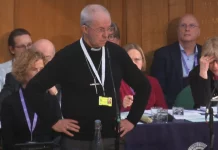The exotic contents of Mystical Passion: spirituality and sensuality written 25 years ago by now-Cardinal Víctor Manuel Fernández have been well covered in the Catholic press by now.
Responses have ranged from a mixture of horror at what appears to be an exercise in theological pornography at one end, to at the other a sympathetic reminder that sex and spirituality have always had a complex relationship and theologians are entitled to explore the area without prudish hyper sensitivity inhibiting them.
Among its chapters, the present prefect for the Dicastery of the Doctrine of the Faith (DDF) wrote graphically, and with some authority, on the difference between male and female orgasms. He was concerned, in particular, with how one could find God in a partner’s orgasm.
In his evaluation of the implications of passion both of the spirit and of the body, he wrote that if mystics can obtain sensual experiences of the presence of God, then “He can make himself present when two human beings love each other and reach orgasm; and that orgasm, lived in the presence of God, can also be a sublime act of the presence of God”.
In a 9 January Catholic Herald article, the cardinal is reported discussing the contents of the book and explaining why he withdrew it from publication and would not write it again today.
So where on the scale of critique does the right level of response to Mystical Passion lie? Perhaps the best place to begin is with the antithetic world view of Freudian deconstruction (in the popular sense).
It was a truism amongst Freudians that Christian mystics and women in particular were inspired and disturbed by unresolved sexual frustration. The experiences of Teresa of Avila were usually picked on from this very particular set of presuppositions.
Anyone who knows anything first-hand about spiritual experience realises this is a lamentable mis-categorisation. If you inhabit a world dominated by sexual dynamics as the main driver of human conscious and unconscious appetite, it is inevitable that you would misconstrue any ecstasy as being sexual. Christians know that isn’t true.
The bliss that comes as an occasional gift of the Holy Spirit is experienced as a form of ecstasy. But only in a very shallow and restricted world is ecstasy exclusively sexual. Indeed, ecstasy comes in a variety of what we might call genres, or dimensions. For many, music is the most common means of achieving or being subsumed into ecstatic bliss. Abraham Maslow was the psychologist who made “peak experiences” more popularly accessible as a description of common bliss.
Peak experiences have been described by exponents of Maslow as “rare, exciting, oceanic, deeply moving, exhilarating, elevating experiences that generate an advanced form of perceiving reality, and are even mystic and magical in their effect upon the experimenter”.
It is obvious to the most casual of observers that peak experiences of bliss can be occasioned by a wide variety of stimulae: aesthetic, artistic, music, nature, sex, mystical experience, and even intellectual joy and perception. But the Maslow definition points us in the right direction and takes us closer to the heart of what is at stake here: the crossover between the sexual, mystical and magical.
One of the most alarming aspects of the way in which Fernández has written, is that he shares the same presuppositions about sex as esotericists and those who practice (dark) magic. Sex for them is a means of instrumentation of the divine, as it is for Fernández; in esotericism – it is claimed – sex facilitates a direct experience of the Godhead. The Christian riposte to the esoteric tradition is that it mistakes deity.
It was during the Renaissance that we find the developments of this basic idea in thinkers who inhabited the crossover between Christianity, science and magic that the alchemical world produced. Marsilio Ficino (1433-1499) and Giordano Bruno (1548-1600) posited that the erotic principles of attraction, the occult powers of magic and the dynamic structure of the universe are all part of a single continuum.
The dangerous and obscure arena of magic exists on a spectrum also. But a common premise posited by sex magicians is the concept that sexual energy is a potent force that can be harnessed to transcend a common and unenlightened perception of reality.
An example of this murky and problematic area is found in the 19th-century American occultist Paschal Beverely Randolph (1825-75). He wrote: “True sex-power is God-power and as such, the power of orgasm can be used by a man and woman for various gains, both worldly and spiritual.” This has alarmingly similar resonances to the outlook and language of Fernández’s book.
But further along the spectrum of magic and sex, at the very much darker end, we arrive at the notorious practioner Aleister Crowley. He posited: “Mankind must learn that the sexual instinct is…ennobling. The shocking evils which we all deplore are principally due to the perversions produced by suppressions.”
The details of Crowley’s occultism, which included the deliberate desecration of places and people using sex that incorporated children and animals, are unhelpfully shocking. It’s also shocking that this esoteric and occult world share the same presuppositions about orgasm, sexual ecstasy and the divine that we are presented with in Fernández’s Mystical Passion.
But if in order to examine his thesis we return to the more prosaic world of music, we can test his thesis with fewer embarrassments. The world of Church music, which contains some of the most exquisite and ecstatic music ever written, carries both listener and performer potentially, and sometimes in reality, to the most sublime aesthetic ecstasy.
The point where beauty, longing, cadence and climax meet in music and the divine is a place of wondrous overlap. But there is nothing automatic in the transition from musical ecstasy to an ecstatic apprehension of the Godhead. It can happen. It might happen. It is not impossible for it to happen.
At the same time, amongst the practitioners of music there is nothing automatic in their aesthetic sensibilities that means that music in itself provides a necessary or consequential experience of God. It may bring one close (or it may not), but its link with divinity is overshadowed by the Fall and the spiritual obtuseness of humanity before it is reborn through the Holy Spirit.
Cardinal Fernández – admittedly writing as a younger man; he was a 36-year-old priest – makes the fatal and one has to say heretical error or attributing to sexual climax an automatic instrumentation of divinisation. He shares the alchemical and esoteric view of the uninterrupted continuum that allows humanity to access divinity through the gateway of some form of mysticism. The experience and teaching of the Church is that this is neither true, nor Christian.
There is always room for some well-grounded theological exploration of the relationship between body and soul, beauty and longing, animal and angel, appetite and eroticism, fulfilment and self-negation, and of how those find expression particularly in sexuality. But we don’t find that in Cardinal Fernández’s youthful effort. We find instead the theological presuppositions of the esoteric and heterodox.
It’s something of a surprise that a cardinal at the heart of the Vatican who claims to be an academic theologian shows no more awareness of this than worrying that he might simply be misunderstood. His point about how he quickly suppressed his own book after its 1998 publication because he was wary of it being misunderstood, without displaying any recognition that he may have been theologically under-informed, suggests he thinks the fault lies in others, not himself.
One other area that his preoccupation with orgasm and sexual appetite presents for examination is the question that this raises – especially in light of his endorsement and publication of Fiducia Supplicans – in regard to his promotion and endorsement of gay culture and practice. Any world view that defines your humanity primarily in terms of genital attraction is one in which sex is elevated far beyond its proper and indeed Christian level of importance.
It is in gay culture, not Christian culture, that sexual attraction and climax become an experiential and cultural priority.
Furthermore, there are some critics who have been taken aback by his easy familiarity and uninhibited writing about genitals, orgasms and erotic fluency. They wonder if his own responsibilities for sexual continence as a priest can be relied upon? His writing does not sound that of a committed celibate.
But perhaps the real anxiety is not that Cardinal Fernández might have had too many sexual experiences, but that he has had too few Christian ones? If his experience of the Holy Trinity were of a more personal and intimate kind, he would know from his own experience that the overwhelming beauty that the exquisite outpouring of the Holy Spirit conveys in such moments of occasional grace that come, is of a very different nature from orgasmic climax.
This imbalance of experience between the sensually erotic and the sanctified pneumatic is something of a disadvantage for someone who holds his eminent position and demanding theological responsibilities at the helm of the DDF. It cannot be a great surprise that many Catholics believe that his promotion to his current position in the Vatican had a deeper political than theological motivation.
Now that the direction of his expertise has been shown to lie elsewhere, he might consider resigning.










